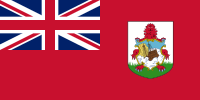 Bermuda (pronounced /bɜrˈmjuːdə/; officially, the Bermudas or Somers Islands) is a British overseas territory in the North Atlantic Ocean. Located off the east coast of the United States, its nearest landmass is Cape Hatteras, North Carolina, about 1,030 kilometres (640 mi) to the west-northwest. It is about 1,373 kilometres (853 mi) south of Halifax, Nova Scotia, Canada, and 1,770 kilometres (1,100 mi) northeast of Miami, Florida. Its capital city is Hamilton but the largest municipality is the town of Saint George’s.
Bermuda (pronounced /bɜrˈmjuːdə/; officially, the Bermudas or Somers Islands) is a British overseas territory in the North Atlantic Ocean. Located off the east coast of the United States, its nearest landmass is Cape Hatteras, North Carolina, about 1,030 kilometres (640 mi) to the west-northwest. It is about 1,373 kilometres (853 mi) south of Halifax, Nova Scotia, Canada, and 1,770 kilometres (1,100 mi) northeast of Miami, Florida. Its capital city is Hamilton but the largest municipality is the town of Saint George’s.
Bermuda is the oldest and most populous remaining British overseas territory, settled by England a century before the Acts of Union created the united Kingdom of Great Britain. Bermuda’s first capital, St George’s, was settled in 1612 and is the oldest continuously inhabited English town in the Americas.
Bermuda has an affluent economy, with finance as its largest sector followed by tourism, giving it the world’s highest GDP per capita in 2005. It has a subtropical climate.
Bermuda’s culture is a mixture of the various sources of its population, though little trace remains of the various Native American, Spanish-Caribbean, African, Irish or Scots cultures that would have been evident in the 17th century, with Anglo-Saxon culture becoming dominant. Today, the only language other than English that is spoken by any substantial part of the population is actually Portuguese, following one hundred and sixty years of immigration from Portuguese Atlantic islands (primarily the Azores, though also from Madeira and the Cape Verde Islands). There are strong British influences, together with Afro-Caribbean.
A second wave of immigration from the West Indies has been sustained throughout the 20th century, although, unlike the Africans who immigrated to that area as indentured servants (or who were imported as slaves) in the 17th century, the more recent arrivals have mostly come from English speaking countries (albeit, most of the West Indian islands whose populations now speak English were then part of the Spanish Empire). This new infusion of West Indians has both accelerated social and political change, and diversified Bermuda’s culture. West Indian musicians introduced Calypso music when Bermuda’s tourist industry was expanded with the increase of visitors brought by post Second World War aviation. While Calypso music appealed more to the visitors than to the locals, Reggae has been embraced since the 1970s with the influx of Jamaican immigration.
The colony’s economic mainstays are international financial services, especially insurance and reinsurance, and tourism. Fine beaches, an excellent climate, and picturesque sites have made Bermuda a fashionable and popular year-round resort. Semitropical produce, sales of fuel to aircraft and ships, and the reexport of pharmaceuticals also contribute to the economy. Most capital equipment and food is imported. Bermuda is divided into nine parishes and two municipalities. The British monarch, represented by a governor, is titular head of state. Bermuda is led by a premier and has a bicameral parliament with an appointed 11-member Senate and an elected 36-member House of Assembly.
About 55% of Bermuda’s inhabitants are of African ancestry, descended from slaves brought to the islands during the 18th cent.; there is also a sizable population of British descent. English is spoken. The main religions are the Anglican, Roman Catholic, African Methodist Episcopal, and other Christian churches.
Notes from Wikipedia and Answers.com









